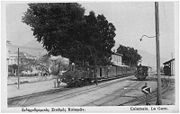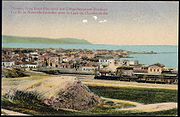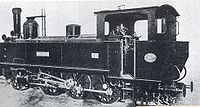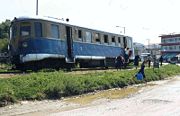
Piraeus, Athens and Peloponnese Railways
Encyclopedia

Metre gauge
Metre gauge refers to narrow gauge railways and tramways with a track gauge of . In some African, American and Asian countries it is the main gauge. In Europe it has been used for local railways in France, Germany, and Belgium, most of which were closed down in mid 20th century. Only in Switzerland...
) line connecting Piraeus and Athens to Peloponnese. The company was nationalized in 1954 and absorbed by the Hellenic State Railways
Hellenic State Railways
Hellenic State Railways or SEK was a Greek public sector entity which was established in 1920 and operated most Greek railway lines until 1970.-History:...
in 1962.
History


Tripoli, Greece
Tripoli is a city of about 25,000 inhabitants in the central part of the Peloponnese, in Greece. It is the capital of the prefecture of Arcadia and the centre of the municipality of Tripolis, pop...
, from the bankrupt Southern Greece Railways (Sidirodromoi Mesimbrinis Ellados). The two routes to Kalamata, via Patras and via Tripoli, merged at Zevgolatio.
Short branches were also constructed to serve important towns: Argos-Nafplion, Lefktro-Megalopolis, Kavasila-Vartholomio-Kyllini, Vartholomio-Kyllini Spa (Loutra), Pyrgos to Ancient Olympia, Asprochoma-Messini and, much later (1954), Isthmos-Loutraki. Diakofto Kalavrita Railway
Diakofto Kalavrita Railway
The Diakofto–Kalavryta Railway is a historic gauge rack railway in Greece. Located on the northern Peloponnese, it runs 22 km from Diakofto through the Vouraikos Gorge and the old Mega Spilaion Monastery and up to Kalavryta, stopping en route at Zachlorou.The line was built by the Piraeus,...
was also constructed by SPAP, but at a smaller gauge .
The line from Piraeus to Corinth was 99 km, from Corinth to Kalamata via Tripoli 236 km and from Corinth to Zevgolatio via Patras and Pyrgos 347 km. The total length of the system with the branch lines was 731 km.
In 1929 SPAP acquired the Heraklion
Heraklio station
The Heraklio station is an ISAP train station in Irakleio, Attica, Greece, a suburb to the north of Athens. It is marked at the 19,246 km from the starting point in Piraeus....
-Lavrion section of Athens-Lavrion Railway, formerly operated by Attica Railways
Attica Railways
Attica Railways was a railway company which operated a metre gauge railway system in Attica, Greece.The contract between the Greek government and the Hellenic Company of Lavrion Metallurgies was signed in 1882...
, and constructed a link from Kato Liossia (today Agioi Anargyroi) to Heraklion
Heraklio station
The Heraklio station is an ISAP train station in Irakleio, Attica, Greece, a suburb to the north of Athens. It is marked at the 19,246 km from the starting point in Piraeus....
, to connect the Lavrion line to its network (1931). Passenger services on this branch were suspended in 1957 and it was cut off from the rest of the network in 1962, due to the construction of the Athens-Thessaloniki highway.
During the Axis occupation of Greece in World War 2, and especially during the withdrawal of German troops in 1944, the network and the rolling stock suffered extensive damages both by the German army and by Greek resistance groups. Repair of SPAP assets was time consuming and expensive. Damaged rolling stock was mainly repaired at Piraeus Engine Sheds. Normal levels of service resumed at about 1948 with the exception of the destroyed bridge of Achladokampos (between Argos and Tripoli), which was rebuilt by OSE in 1974.
In 1951 SPAP absorbed the small Pyrgos-Katakolo Railway. In 1953 SPAP absorbed Northwestern Greece Railways (SDBE), which operated a metre gauge
Metre gauge
Metre gauge refers to narrow gauge railways and tramways with a track gauge of . In some African, American and Asian countries it is the main gauge. In Europe it has been used for local railways in France, Germany, and Belgium, most of which were closed down in mid 20th century. Only in Switzerland...
line from Kryoneri to Messolongi and Agrinion.
In 1920 SPAP was briefly nationalized as part of the Hellenic State Railways
Hellenic State Railways
Hellenic State Railways or SEK was a Greek public sector entity which was established in 1920 and operated most Greek railway lines until 1970.-History:...
but it became an independent company again two years later. Due to high debts, SPAP came under government control in 1939-1940 and was formally nationalized again in 1954. In 1962 the company was absorbed by the Hellenic State Railways
Hellenic State Railways
Hellenic State Railways or SEK was a Greek public sector entity which was established in 1920 and operated most Greek railway lines until 1970.-History:...
.
Steam locomotives
Between 1883 and 1962 SPAP used 128 locomotives of 25 different types.| Class | Type | QTY | Manufacturer | Model | Power | Year | Photo |
|---|---|---|---|---|---|---|---|
| Α1-4 | 4-4-0 | 4 | Krauss | 1884 |  |
||
| A1-6 | 0-6-0T | 6 | Couillet | 1888 |  |
||
| B101 | 2-4-0T | 8 | Krauss | 1883 | |||
| B111 | 2-4-0T | 4 | Krauss | 1888 | |||
| Βς151 | 2-4-0T | 5 | Henschel | 1912 |  |
||
| Γ201 | 2-6-0T | 5 | Krauss | 5 | |||
| Γ206 | 2-6-0T | 8 | Couillet | 1890 |  |
||
| Δ101 (Δα) | 2-8-2 | 8 | Vulcan Iron Works Vulcan Iron Works Since Vulcan was the Roman god of fire and smithery, the name was an obvious choice for an iron foundry or mechanical engineering works in the nineteenth century, both in England, the birthplace of the Industrial Revolution, and in the United States.-England:... |
USATC S-118 USATC S118 Class The United States Army Transportation Corps S118 Class is a class of 2-8-2 steam locomotive. Built to either or Cape gauge, they were used in at least 24 different countries across the World.... |
644 kW | 1947 |  |
| Δ111 (Δι) | 2-8-2 | 10 | Breda | 770 HP | 1951 | ||
| Ε151 | 4-4-0T | 2 | Krauss | 1887 | |||
| Ες701 Ες711 |
2-8-0 | 5 | Borsig | 1912–1915 | |||
| Ες721 | 2-8-0 | Linke-Hofmann Linke-Hofmann Linke-Hofmann was a German manufacturing company established in Breslau to produce locomotives and rolling stock. Its origins lay in the wheelwright business of Gottfried Linke, begun in 1834... |
1925 |  |
|||
| Ζ500 | 2-6-0T | 1 | Vassiliadis Works Basileiades Basileiades is one of the most historic Greek machine building companies and the largest in its field in the country during the second half of the 19th century... |
1900/1929 |  |
||
| Ζ 501 | 2-6-0T | 17 | Grafenstaden | 1890–1901 | |||
| Zcom 518 | 2-6-0T | 9 | Krauss | 1902–1906 | |||
| Ζς 530 | 2-6-0T | 4 | Krauss | 1911 |  |
||
| Ζς 540 | 2-6-0T | 3 | Krauss | 1926 | |||
| ΔΚ1-5 | 0-6-2RT (750 mm) | 5 | Cail/MPR | 1891/1954 |  |
||
| ΔΚ11 | 0-6-RT (750 mm) | 1 | Krupp | 1891 | |||
Diesel multiple units
SPAP introduced diesel railcars and multiple units early in 1937. They reduced journey times and offered good passenger facilities.| Class | Type | QTY | Manufacturer | Model | Power | Year | Photo |
|---|---|---|---|---|---|---|---|
| ΑΚ210 | Β-2 | 8 | DWF/MAN | 1937 |  |
||
| 3ΑΚ1000 | B-2-2-B | 7 | Esslingen | 1956–1957 | |||
| 3ΑΚ640 | B-2-2-B | 13 | DeDietrich De Dietrich Ferroviaire De Dietrich Ferroviaire is a French manufacturer of railway rolling stock based in Reichshoffen, France. It was formed as a division of the De Dietrich group, which has a .... |
1950–1952 |  |
||
| 2ΑΚ420 | B-2-B | 8 | Linke-Hofmann Linke-Hofmann Linke-Hofmann was a German manufacturing company established in Breslau to produce locomotives and rolling stock. Its origins lay in the wheelwright business of Gottfried Linke, begun in 1834... |
1937 |  |
||
| ΑΔΚ01 (750mm) | B-B+2+2-2 rack |
3 | Billard | 1958 | |||
| ΑΚ2Χ155 | 1A-A1 | 3 | Breda | 1952 |
Diesel locomotives
| Class | Type | QTY | Manufacturer | Model | Power | Year | Photo |
|---|---|---|---|---|---|---|---|
| DBς320.01 | 1-B | 1 | Piraeus Works | 320 HP | 1961 | ||

